Washington D.C. – Peter Navarro On India delivered scathing criticism following Prime Minister Narendra Modi‘s public display of unity with Russian President Vladimir Putin and Chinese President Xi Jinping during the Shanghai Cooperation Organisation summit in Tianjin on September 1. The Trump administration’s senior counsellor for Trade and Manufacturing expressed deep concern over India’s diplomatic positioning, describing the trilateral show of camaraderie as fundamentally problematic for global democratic alliances.
The remarks by Peter Navarro On India came immediately after the three world leaders demonstrated unprecedented bonhomie on the sidelines of the international summit, creating ripples across diplomatic circles and raising questions about India’s strategic alignment in an increasingly polarized world.
“Getting in Bed with Dictators” – Strong Words from White House
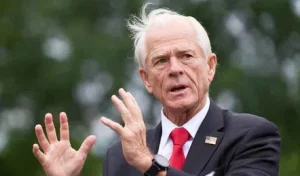
When questioned about the unity display between the three leaders, Peter Navarro On India used particularly harsh language to characterize Modi’s diplomatic approach. Speaking from the White House on Monday, September 1, 2025, Navarro expressed his dismay at seeing the leader of the world’s largest democracy aligning with what he termed “the two biggest authoritarian dictators in the world.”
The Trump administration official’s commentary represents one of the most direct and critical assessments of India’s foreign policy choices by a senior American government representative. Peter Navarro On India specifically highlighted the contradiction he perceived between India’s democratic values and its diplomatic engagement with Russia and China.
“It was a shame to see Mr. Modi getting in bed as the leader of the biggest democracy in the world with the two biggest authoritarian dictators in the world, Putin and Xi Jinping. That doesn’t make any sense,” Navarro stated, emphasizing his administration’s disappointment with India’s strategic choices.
Historical Context of India-China Tensions Highlighted
The criticism from Peter Navarro On India gained additional weight when he referenced the long-standing tensions between India and China, noting the apparent contradiction in Modi’s diplomatic approach. Navarro pointed out that India has been engaged in what he described as a “cold war and sometimes a hot war with China for decades,” making the trilateral display particularly puzzling from Washington’s perspective.
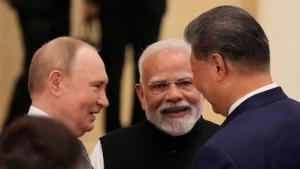
This observation by Peter Navarro On India touches on fundamental questions about India’s ability to balance competing geopolitical interests while maintaining strategic autonomy. The Trump administration’s perspective suggests that Washington views India’s engagement with China as incompatible with broader democratic alliance objectives.
The historical context referenced in the Peter Navarro On India remarks includes border disputes, trade tensions, and military confrontations that have characterized India-China relations for decades, making the SCO summit display particularly significant from an American foreign policy standpoint.
Deteriorating India-US Relations Reach Critical Point
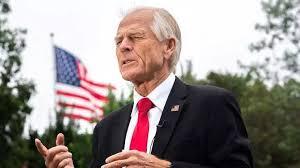

The latest Peter Navarro On India statements come against the backdrop of what many analysts consider the worst phase in India-US relations in over two decades. The Trump administration’s aggressive trade policies and consistent criticism of New Delhi have created unprecedented strain in bilateral ties, with the SCO summit display serving as another flashpoint.
Current tensions encompass multiple areas of disagreement, from trade policies to energy procurement choices, creating a complex web of diplomatic challenges that the Peter Navarro On India remarks have further complicated. The administration’s approach reflects a broader frustration with India’s independent foreign policy stance.
Massive Tariff Burden Imposed on India
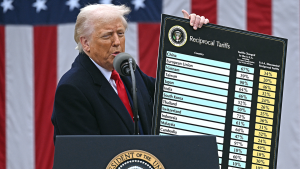

The Trump administration has implemented severe economic measures against India, with Peter Navarro On India policy recommendations contributing to unprecedented tariff levels. The United States has imposed 25 percent reciprocal tariffs on India, along with an additional 25 percent levy specifically targeting Delhi’s purchases of Russian oil.
This combined tariff burden brings total duties imposed on India to 50 percent, representing among the highest tariff levels globally. The Peter Navarro On India influenced policy demonstrates the administration’s willingness to use economic pressure to influence Indian foreign policy decisions.
India has responded by characterizing these American tariffs as “unjustified and unreasonable,” setting up a potential escalation in trade tensions that could have far-reaching economic implications for both nations.
Energy Security Versus Alliance Expectations
Central to the Peter Navarro On India criticism is Washington’s opposition to India’s continued energy relationship with Russia. Despite Western sanctions imposed after Russia’s invasion of Ukraine, India has maintained its position that energy procurement decisions are driven by national interest and market dynamics rather than geopolitical considerations.
Russia has emerged as India’s primary energy supplier since Western sanctions targeted Russian crude oil, creating a fundamental conflict between American alliance expectations and Indian energy security priorities. The Peter Navarro On India position demands that New Delhi abandon these economic relationships in favor of Western alignment.
Call for Strategic Realignment
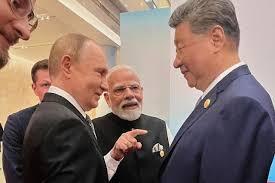

The Trump administration’s message, as articulated through Peter Navarro On India statements, calls for a fundamental shift in Indian foreign policy. Navarro specifically urged Modi to align with Washington, Europe, and Ukraine rather than maintaining relationships with Russia, reflecting broader American expectations for democratic solidarity.
“We hope that the Indian leader comes around to seeing that he needs to be with us and Europe and Ukraine and not with Russia on this and he needs to stop buying the oil,” Navarro stated, outlining clear expectations for Indian policy changes.
This strategic realignment demand represents a significant challenge to India’s traditional non-alignment principles and raises fundamental questions about sovereignty in foreign policy decision-making within the current global context.

